Pediatric Residency Program Overview
Overview of the Pediatric Residency
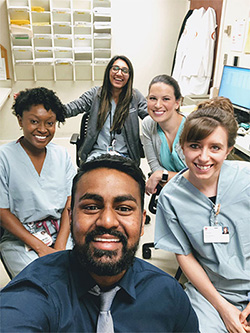
Our Pediatric Residency program allows residents to have the perfect balance between patient care, educational conferences, procedures, and formation of lifelong friendships amongst colleagues. Loyola is one of the only pediatric tertiary care centers with pediatric trainees located in the Chicagoland western suburbs.
Loyola prides itself in its medium-size program which allows for a family feel among the residents and the faculty. Residents are in direct contact with attendings, which allows them to form close relationships with faculty who ultimately will be able to provide strong letters of recommendation after graduation.
The Loyola Pediatric Residency program consists of a total of 46 residents and NICU fellows:
- Ten (10) pediatric residents per year
- Four (4) medicine-pediatric residents per year
- Two (2) NICU fellows per year
The residency program is located in the Loyola University Medical Center. Our pediatrics hospital include the following beds and a dedicated Pediatric sections of the Emergency Department.
- 30 bed Level III neonatal intensive care unit (NICU)
- 14 bed pediatric intensive care unit (PICU)
- 20 bed general pediatric floor unit
- 10 bed monitored step-down unit
- 20 newborn nursery beds, part of the certified Baby-Friendly program – Read about how Loyola earned this prestigious Baby-Friendly designation
The pediatrics program is part of a larger Trinity Health network, which provides expanded opportunities for residents to see a wide variety of patients. Loyola University Medical Center is a Level 1 Trauma Center and has a burn unit, 40% of which are children (Pediatric Burns and Trauma).
Pediatric Residency Curriculum
The curriculum is intended to build upon basic experiences of intern year with increasing challenges as training proceeds. Specialty rotations and electives have been built into the schedule to allow for an individualized curriculum that encourages residents to reflect on their interests and areas of experience that need to be strengthened.
Our schedule allows for maximum flexibility in the PL-2 and PL-3 year to allow preparation for the next phase of training or practice.
PL-1 (1.5 months – 6 weeks – call-free)
| Inpatient Ward | 3 months |
| Nights | 1 month = 2 weeks x 2 |
| NICU | 1 month |
| Newborn Nursery | 6 weeks |
| Adolescent Medicine | 1 month |
| Dermatology/Allergy/Immunology | 1 month |
| Behavior/Development | 1 month |
| Emergency Department | 3 months during elective blocks |
| Individual Curriculum (1) | 2 weeks |
| Individual Curriculum (2) | 1 month |
| Vacation | Vacation 1 month = 2 weeks x 2 OR 2 weeks x 1 + 1 week x 2 |
PL-2 (2 months call-free)
| Acute Care | 1 month |
| Cardiology | 3 weeks |
| Endocrinology | 1 month |
| Emergency Medicine | 2 months |
| Infectious Disease | 1 month |
| PICU | 1 month |
| Advocacy/Community | 1 month |
| Renal | 1 month |
| Individual Curriculum (3) | 1 month |
| Individual Curriculum (4) | 1 month |
| Vacation | Vacation 1 month = 2 weeks x 2 OR 2 weeks x 1 + 1 week x 2 |
PL-3 (3 months call-free)
| Inpatient Ward | 1-2 months |
| OWL (Night Senior) | 1 month = 2 weeks x 2 |
| Emergency Medicine | 1-2 month |
| PICU | 1 month |
| NICU | 1 month |
| Newborn Nursery Senior | 2 weeks |
| Private Practice | 2 weeks |
| Individual Curriculum (5) | 1 month |
| Individual Curriculum (6) | 1 month |
| Individual Curriculum (7) | 1 month |
| Individual Curriculum (8) | 1 month |
| Vacation | Vacation 1 month = 2 weeks x 2 OR 2 weeks x 1 + 1 week x 2 |
Continuity Clinic
In addition to the above designated rotations, residents spend one half day per week in their own continuity practice. Residents are assigned to a small practice in the Loyola outpatient center with 2-3 other residents and a general pediatrics faculty member. Residents are encouraged to build a practice and follow children longitudinally over a three-year period of time. They are regarded as the primary care taker and patients identify the residents as their personal physicians.
Electives
Residents are able to customize their schedules to their interests using their individual curriculum blocks. The following electives are available:
| Allergy/Immunology | Dermatology | Endocrinolgy |
| Infectious Disease | Advocacy | Community |
| Renal | Cardiology | Neurology |
| Sports Medicine | Palliative Care | Heme/Onc |
| Gastroenterology | Radiology | Adolescent/Psych |
| Sedation | Hospitalist Medicine | Ultrasound |
| Private Practice | Emergency Medicine | Research |
| Peds Ortho | Peds ENT | Advocate |
Broad Education
To complement the teaching during scheduled rotations, a core curriculum has been established, which runs over an 18-month period and is repeated twice during a resident's tenure in the program. In addition to educational lectures, the lecture series also includes topics such as wellness during residency, residents as teachers, and career planning.
Monday – Morning Report 8am-9am
Tuesday – Grand Rounds 8am-9am
Wednesday – Morning Report 8am-9am
Thursday – Noon Conference 11am-1pm (Lunch Provided)
Friday – Morning Report 8am-9am
Conferences have varied teaching styles, consisting of:
- Ward, PICU, NICU patient presentations
- Chief lectures
- Faculty lectures
- Board review lectures
- Quality improvement (M&M) project presentations
- Journal club
- Flipped classroom
Simulation Lab in Stritch School of Medicine
Our pediatric department has the ability run mock codes and resuscitation scenarios by using the SimBaby and SimJunior to re-enact potentially real-life clinical situations in the simulation lab and in the PICU. During intern year, the primary focus during these mock codes is improving interprofessional communition skills and gaining confidence to actively participate during a code; wheareas second and third year residents will primarily focus on the correct diagnosis and treatment.
Residents are able to practice life-saving techniques like bag-mask-ventilation, intubation, cardioversion and defibrillation in a simulated environment, while developing team work and critical thinking. Julie Fitzgerald, MD, Almas Syed, MD and Marsha Ma, MD are the faculty members who organize and teach during these sessions.
For more information, please visit https://hsd.luc.edu/simulation/walgreen.
Global Health Experiences through Stritch School of Medicine
Loyola University Stritch School of Medicine Department of Ministry sponsors annual mission trips to Haiti, Dominican Republic, Zambia, Honduras and Guatemala.
Residents are given the opportunity to apply to the Global Health Program. If chosen, they are assigned some online modules and community service over the first two years. They are then able to participate in a two-week Global Health trip during their third year of residency.
The focus of the trips is on personal development and serving others. We join local health care providers in administering care in rural settings. While we learn much about international health care, our greater goal is to learn from and serve the communities we visit. We hope to return with experiences that will advance our lifelong practice of medicine.
The trips are funded the Graduate Medical Education.
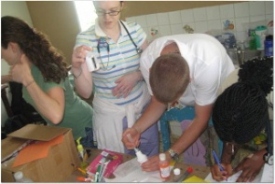 |
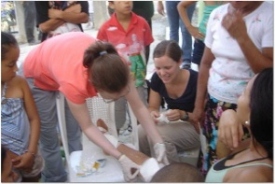 |
Research Project
All residents have two project requirements during their residency: The goal of these projects is to allow residents to practice evidence-based medicine and to contribute to the improvement of patient care.
These research projects have given the opportunity to our residents to build their CV for the professional career and to go to various national and international conferences to present their work. Residents who are chosen to present at a conference can apply for funding to help cover any travel expenses.
Clinical Research Educational Study Team (CREST)
The Pediatric Residency Program uses the CREST model for clinical research projects. Required for those pursuing a fellowship, optional for those going into primary care.
- Teams of 1-2 interns/seniors working on a research project
- A faculty member serves as a mentor
- PGY-1: project identification
- PGY-2: data collection and data analysis
- PGY-3: write-up and presentation(s) at Grand Rounds and local/national conference(s)
- You are allowed to do a 2-week research elective during PGY-2 and PGY-3 year(s)
- A committee of faculty provides oversight for all resident research projects
As part of the research curriculum, core lecture topics include:
- Overview of research
- IRB application process
- Basic statistics
- Literature searching
- Using library resources
Quality Improvement (QI) Project
Residents also complete a quality improvement project during their residency with a faculty member, which has the following objectives:
- To learn the basic principles involved in peer review of medical record
- To perform a literature review in order to determine best practice or standard of care for a given problem and apply that practically to a real situation
- To learn to lead a discussion on potentially controversial topics related to medical management.
- To learn how to identify adverse events, the system failures behind them and use these to propose changes for prevention of future events and improvement of patient care.
- To implement change through work on a multi-disciplinary project created as a result of the above review and discussion.
Upon completion of the project, residents will answer the following questions:
- What was the adverse event/outcome?
- What factors led to the adverse event? Systems failure? Individual error?
- What is the impact to patient/family? Provider? Institution? Society?
- Is there a standard of care, and did we meet it?
- Was the event preventable?
- What can be done to prevent future similar events?
They spend the following year pursuing the most significant intervention and completing the appropriate PDSA cycles to represent the information during their PGY-3 year at a Grand Rounds presentation.
Resident Wellness
Our program has a multi-faceted approach to addressing wellness and resiliency in our residents. Current and future programs within the residency include the following:
Professional Wellness:
- Resident Advising: Residents choose one faculty member as their advisor during their first year of residency. The advisor they choose will provide mentorship throughout residency and will meet with the resident several times during the year.
- Resident as Teachers: This lecture series focuses on teaching our residents how to effectively teach and provide feedback to junior residents and medical students.
- Retreats: Retreats are held on an annual basis to prepare the class of residents for their next year of residency and to provide time for them to come together and socialize.
- Academic Half Day: Each resident has dedicated half days during certain rotations where they can schedule health appointments or just have the afternoon off.
Social Wellness:
- Annual Attendings vs Residents Competitions: Throughout the year, activities ranging from softball game to bowling are organized to promote attending/resident bonding outside of the clinical setting.
- Annual Holiday Party: Residents are alloted time off to have a holiday party during the winter months in addition to the residency-wide holiday lunch that occurs in December.
- Book Club: Attendings and residents can choose to participate in the residency book club that meets periodically to discuss their chosen novel for the year.
- Snack Rounds: Our chief residents visit the hospital with an abundance of candy and snacks to check-in on our inpatient teams and provide support.
- Inter-Residency Competitions: Through the GME office, annual pumpkin carving, gingerbread house building, and trivia competitions have been held among all the different residencies here at Loyola. Our residents have been proud winners of the gingerbread house building and trivia competitions!
- Resident Wellness Week: Loyola's GME Wellness Committee hosts an annual wellness week in the spring that includes a range of activities like free yoga and treats.
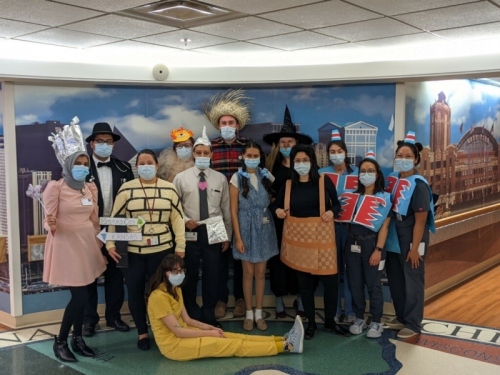
Mental/Spiritual Wellness:
- Debriefs: Attendings and chaplains are present during debrief sessions to help residents process and talk through recent patient deaths.
- Carebridge: Through Trinity Health, residents can access a counselor or work-life specialist. Private consultations on any personal issue is available 24/7.
- Wellness Conferences: Multiple lectures are scheduled throughout the year to address physician wellness and burnout. Additionally, our chief residents host wellness conferences, where residents can take a break from patient care and come together to participate in fun activities and have time to socialize with one another.
- Therapy Animals: Therapy dogs and even a miniature horse regularly visit the hospital to treat not only the patients, but also the staff.
- Holidays: Celebrate holidays (i.e. EID, Christmas and New Year's Day, etc.) off
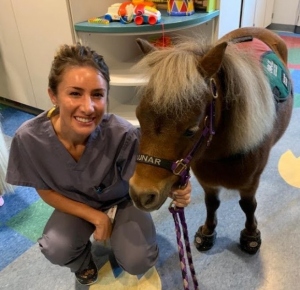
Physical Wellness:
- Annual Races: Through the Trinity Health System and GME office, there are annual races that residents can team-up to participate in.
- On-Site Fitness Center: Residents have the option to become a member at the Loyola Center for Fitness. The fitness center has a wide variety of amenities including strength training and cardio equipment, a lap pool, a warm water therapy pool, racquetball and basketball courts, and group exercise rooms. Gym members can participate in classes like yoga, spinning, aquatic fitness and utilize their massage therapy, personal training, and nutritional counseling services.
- Reimbursed Rides: Loyola GME will provide reimbursement for post-call residents who are unable to safely travel home.
Financial Wellness:
- Book Money: Residents are allocated a yearly stipend that they can use towards board fees, educational materials, or review courses.
- Lectures: Lectures on financial wellness are provided throughout the year.
- Travel Money: Residents who are presenting at conferences are eligible to apply for funding to help cover travel expenses.
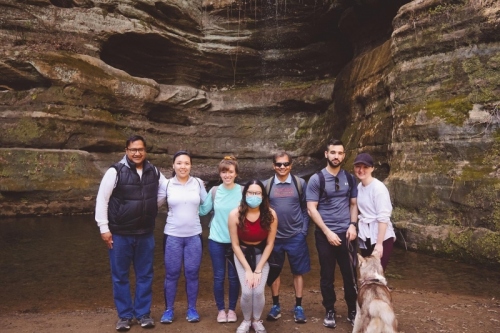
Diversity, Equity and Inclusion Initiatives
The Loyola Pediatrics Diversity, Equity and Inclusion Committee (DEIC) is a resident-led initiative overseen by a volunteer faculty mentor that aims to promote a culture of diversity, equity, and inclusion among faculty and residents within the department. The committee is dedicated to building and sustaining an environment that values the representation of different identities and experiences while drawing attention to the unique needs of underrepresented and historically disadvantaged communities within our healthcare system.
Our goal is to a create a welcoming environment that promotes inquiry, reflection and understanding and to encourage a culture that informs and celebrates the differences within our communities.
Current and planned educational conferences have included implicit bias training, addressing microaggressions and macroaggressions, caring for transgender youth, and addressing racism in medicine. Additionally, the Department of Pediatrics DEIC hosts applicant social events during the residency recruitment process to further the recruitment and development of a diverse population of residents within the program.
We are also represented in Loyola University Medical Center's yearly GME-wide SNMA (Student National Medical Association) recruitment event. We are committed to engaging with our colleagues and patients in a way demonstrates respect and value for diversity.
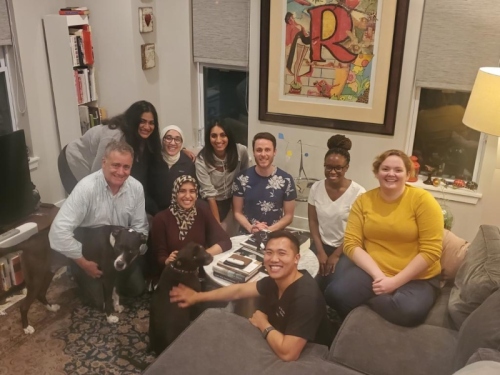
Health Equity and Diversity Visiting Clerkship
The Health Equity and Diversity Visiting Clerkship is a 4-week experience sponsored by the Office of Diversity, Equity and Inclusion at Loyola Medicine for fourth-year students. Students will have the opportunity to rotate at one of Illinois’ top medical centers in the specialty of their preference and participate in the care of medically complex patients from a diversity of socioeconomic and racial backgrounds. The goal of the clerkship is to diversify the physician pipeline and advance diversity, inclusion, and health equity.
- Rotation Date: March through January (depending on the rotation of choice)
- Application: VSLO will begin accepting applications on 03/01/2023
- Deadline to apply: April 1, 2023
- Awards Notification: Awardees will be notified in Spring 2023
- Application Requirements: To apply, students must be 4th year medical students in good standing at an accredited U.S. medical school. Students must submit a personal statement, two letters of recommendation and a medical school transcript.
- Award Amount: Accepted applicants will be provided a $3,000 stipend that students may use at their discretion to cover costs of the rotation.
Community and Advocacy in Pediatrics
Every resident rotates with our community and advocacy pediatricians during their second year of residency. As a part of the rotation, residents will work in our pediatric mobile health unit, which travels to schools throughout Chicago and the suburbs to bring medical treatment to underserved pediatric populations.
The mobile clinic offers routine immunizations and well-child-checks to children and young adults from birth to age 21. Additionally, residents will work with our board certified child abuse pediatrician to learn how to recognize the signs of abuse and neglect and how these patients are treated.
Community Pediatric Engagement Project (CPEP)
The Community Pediatric Engagement Project allows for selected pediatric residents to pursue knowledge and experience in community health leadership to improve child health. The program includes didactic modules and experiential learning that offers residents opportunities to engage with the greater surrounding community to discuss health topics with patients and their families.
Additionally, it assists residents in planning and completing a collaborative project in the community surrounding the Loyola University Medical Center. The community project will fulfill the obligation for a scholarly project. Current projects include implementing a process to evaluate social determinants of health in our clinic population and addressing developmental delay screening in children ages 3 to 5.
Residents may apply to the program at the beginning of their PGY-1 year. One to two residents will be accepted each year to participate in the program. Residents may participate in the program in conjunction with the hospital-wide GME Community and Global Health Engagement Initiative. Residents will choose a faculty or community mentor for the 3-year experience and Proviso Partners for Heatlh (PP4H) leadership will be available as a resource for community mentors.
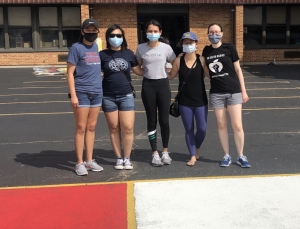 |
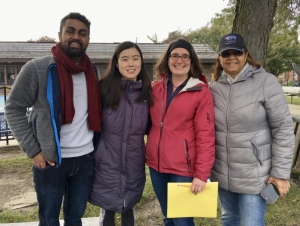 |
